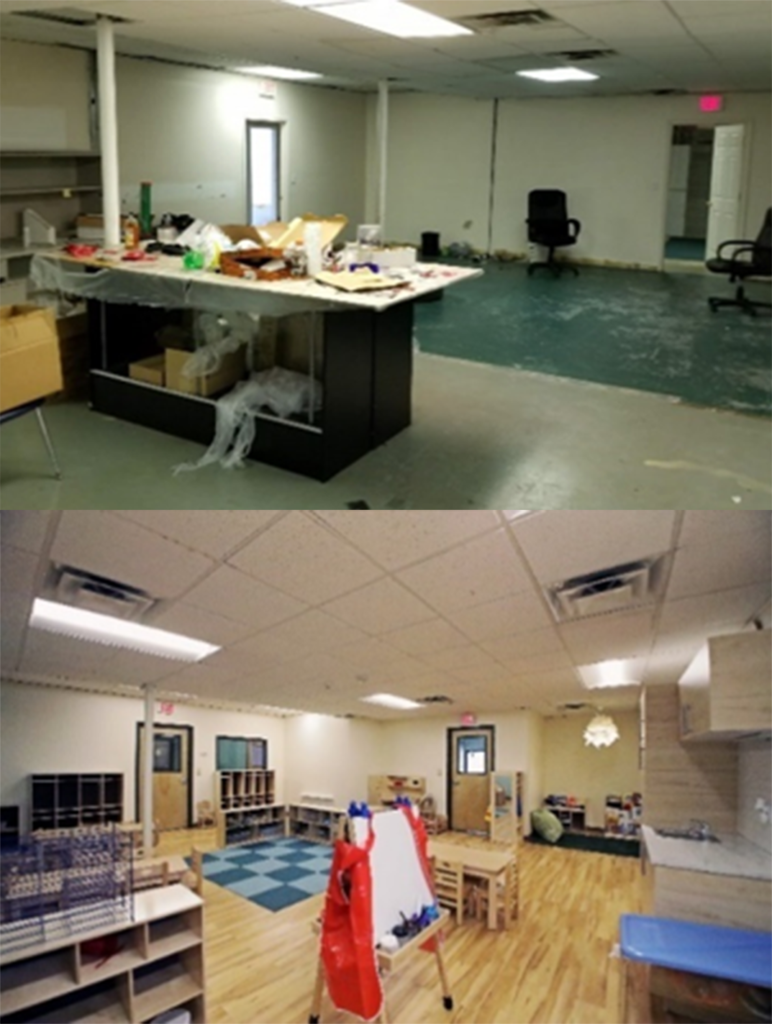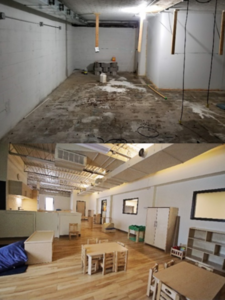There are so many places where LaShawn Bridges’ story might begin. The day she walked off her job at the post office and decided to do something different with her life. The day she became a mother to twin girls, one of whom was expected to never learn to walk or talk. All the times she decided to pursue her own education — from an Associate’s degree to her Master’s degree — while running a daycare and being a wife and mother. Or the moment when, after 18 years running a home-based daycare, she knew she had to do something that she found a little scary: expand to a full-size early childhood education center to serve more children, even though it meant adding many business responsibilities she’d rather avoid.
As child care providers, we think about the ABCs, the 123s, the social-emotional development. But when it comes to our spaces, we usually just make-do.
All these moments and more led Bridges to the grand opening of the new Blessed Beginnings Learning Center, a 5,300-square-foot facility capable of serving 60 children in Detroit’s Mt. Olivet neighborhood — an area IFF research identified as in need of additional early learning slots by. The facility serves infants, toddlers, and pre-schoolers out of four classrooms and includes an outdoor playground furnished with developmentally appropriate equipment.
“This space is a true testimony of a community collaboration,” Bridges says, citing grants from IFF’s Learning Spaces program and the City of Detroit’s Motor City Match program, as well as her new partnership with Matrix Early Head Start and her engagement with the Osborn Business Association. “This place would not be possible without all these different pieces. This is what can happen when programs and policies support a small business owner like myself. Together, they really changed my mindset — and helped out my pocketbook a lot.”
IFF’s Learning Spaces is a grant program designed to improve access to quality early childhood education across the City of Detroit and the tri-county area. Providers like Bridges can receive grant funds that cover renovation costs, as well as technical assistance from IFF’s team of real estate consultants.
Bridges has participated in the program twice — first for improvements to her home-based business in 2016 and then again for the buildout of this new center in the same neighborhood.
“It’s a major accomplishment for home-based providers like LaShawn to achieve a five-star rating, and we were thrilled that she set her sights on expanding into a new center that could bring that high-quality care and education to even more kids and families,” says Jeff Henze, IFF’s Early Childhood Education Program Manager. “LaShawn is very humble, but she tenaciously pursued her very specific vision to build this kind of center in her own community.”
Despite her long track record of success as an early childhood education provider in the community, Bridges says she “honestly didn’t want the responsibility” of a full-size center – at first. “Caring for the children is the easy part. But the business end was much harder for me,” she says. “But I was at a cap — I had reached the limit of kids I could care for in my home. And then I saw reports that talked about how so many children need care, especially here on the east side of Detroit. That put a fire under me, and I knew the next step was to own a center so I could reach more families.”
As she had done many times before, Bridges took control of her destiny. She participated in business classes, and she began seriously networking in Detroit’s early education space. Those efforts led her to IFF — and to the partnerships that helped make the new center a reality. But it wasn’t an easy journey.
For starters, the stock of viable buildings on Detroit’s east side is limited, and often the cost of renovations exceeds the value of the buildings — making it difficult to secure a loan.

“When we started to look for buildings, it was very depressing. Buildings that used to flourish were closed down and abandoned. The infrastructure just wasn’t good,” Bridges says. “But we always drove past this one building that’s only a couple blocks from my home, and when it came up for sale I knew I had to have it.”
In fact, the vacant building had previously functioned as an early childhood education center, making the layout conducive to Bridges’ plans. But there were still significant facility challenges with the space, which had most recently been used as an illegal marijuana-growing operation that had been raided and shut down by the city.
“What was left behind was a bit of a mess,” says Rick Raleigh, IFF’s senior owners representative in Detroit. “There was no natural light as the windows had all been replaced with concrete block. The interior needed a complete renovation and the planned playground area was an old parking lot covered in weeds and debris.”
But Bridges says she was able to see past the “dark and gloomy” interior — in part due to her previous experience with IFF’s Learning Spaces program, which includes capacity-building trainings on what a quality early learning environment can look like.
“Working with IFF the first time — going to summits and seminars that taught us about more natural light, less clutter, better furniture, and other things that benefit children’s brain development — really helped me out a lot,” she says. “So when I came into the building, I immediately saw the potential. I knew that I’d be able to add natural light, change the colors, update the flooring. I saw things other people didn’t see.”

Still, the cost of those renovations would be significant.
Bridges initially bought the facility on a land contract — a deal where the buyer makes payments directly to the seller, rather than to a lender or bank. Such arrangements often have conditions where the seller can take back the building abruptly, making it risky for the buyer to invest in any improvements to the building. Bridges entered into the contract only temporarily, until she secured a mortgage a few months later from two CDFIs, Invest Detroit and Detroit Development Fund.
In the end, the acquisition and renovations were paid for by a combination of Bridges’ own equity, the CDFI loans, a grant from the Motor City Match program for entrepreneurs in the city, and a matching grant from IFF’s Learning Spaces program.
“Real estate deals and renovations are never simple, and it’s not something early ed providers — or any small business owner or nonprofit leader, for that matter — do every day,” IFF’s Henze says. “That’s exactly why IFF exists — to walk hand-in-hand with leaders like LaShawn as they tackle these challenges. We each bring different knowledge to the table, but we’re seeking the same thing – to expand the critical early education services they offer to communities.”
In the end, a suite of IFF services contributed to the successful expansion of Blessed Beginnings:
- Research – Our in-depth research into Detroit’s early education needs helped fuel Bridges’ desire to expand in her own neighborhood — a community identified by our research as in high need of additional child care slots.
- Vital Services – IFF’s in-house team of Early Childcare Education (ECE) experts partnered with Bridges from the beginning to explore the link between programmatic and facilities quality, prioritize facilities improvement options, and engage with a network of other providers tackling similar facilities issues.
- Funding and Financing – IFF’s $230,000 Learning Spaces grant covered approximately 36% of the total project costs needed to transform the space into a best-practice learning environment complete with natural light, soothing colors, durable furnishings, connections to outdoors, and developmentally appropriate classrooms. What’s more, our grant leveraged the city of Detroit’s Motor City grant, which required matching dollars. Additionally, IFF’s lending team helped fortify Bridges’ connection to the mortgage financing obtained with our CDFI partners.
- Real Estate Consulting – IFF’s Real Estate Solutions team was engaged throughout the entire buildout process, including structural assessments, design guidance, and construction management.
“As child care providers, we think about the ABCs, the 123s, the social-emotional development. But when it comes to our spaces, we usually just make-do,” Bridges says. “But spaces are so important. I’ve seen it make such a big difference in the kids’ behavior, and even in the staff’s behavior. It makes everybody happier.”
The new center began enrollment in mid-January and expects to fill up quickly — there’s already a waiting list. In addition to the 60 children served at the center, Bridges will continue to serve children out of her home.
And her twin girls — now 18 years old — are both off to college and flourishing.
“I always had a passion for taking care of children, but the problems my daughters had at birth made me want to know and do everything I possibly could concerning their development,” Bridges says. “That chapter, and all my other learnings since then, made me realize that anybody can babysit — but what’s really intriguing is to know about the stages of development and the theories and principles and the rhyme-and-reason why children do the things that they do. You’re preparing them for kindergarten, and you’re helping them see the potential of who they can be.”
Tags: : Early Childhood Education, Real Estate Solutions, Schools, Strategic Insights